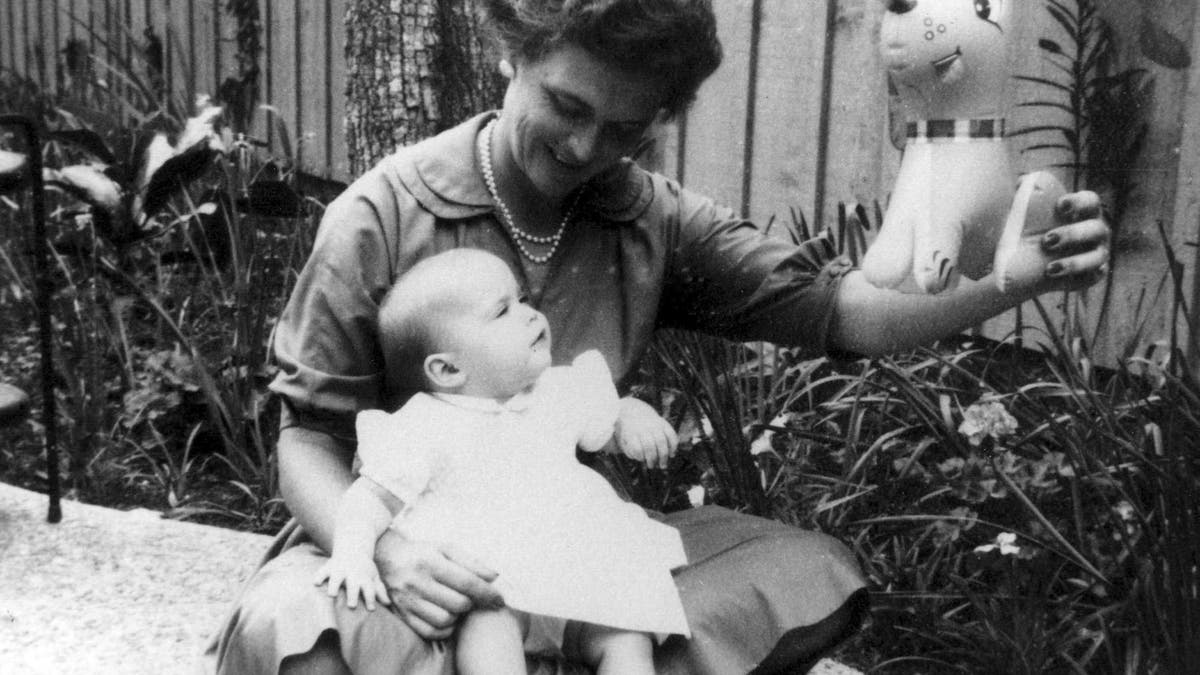
Barbara and her daughter, Doro, Easter, April 1960. (George Bush Presidential Library and Museum)
When I was growing up, my mother, Barbara Bush, read to me every night.
I remember reaching out to turn the pages when I was very small, caught up in the wonder of each story and the vivid pictures that filled my imagination.
I was so fortunate to be raised in a household filled with books and—as you might imagine to be the case in the Bush home—plenty of conversation.
By filling my days with loving words and ending each one with a bedtime story, my mother not only helped me form wonderful childhood memories, but also cultivated vital language and literacy skills that prepared me for success in school—and in life.
Through a new partnership with Talk With Me Baby™, we’re encouraging parents to help build their babies’ brains in a simple, but incredibly important way: by talking to them.
Simply put, early learning matters. The first three years of life are a critical period for brain development. A baby’s brain grows an incredible 80 percent by 18 months of age, meaning that even the earliest learning experiences greatly influence a child’s development of language, literacy and social-emotional skills.
Research shows that children who are raised in language-rich environments—those who have ready access to books and whose caregivers talk with and read to them regularly—are far more likely to start school ready to succeed.
For nearly three decades, the Barbara Bush Foundation for Family Literacy has worked to help parents and children build brighter futures through literacy.
As we begin 2017, we’re committed to raising awareness about the importance of early learning, and providing parents with the knowledge and resources necessary to nurture their babies’ amazing brains.
Through a new partnership with Talk With Me Baby™, we’re encouraging parents to help build their babies’ brains in a simple, but incredibly important way: by talking to them. Both the quantity and quality of the words children hear during their first three years of life make an enormous difference in how prepared they are to start school, and ultimately, their long-term achievement.
Most people understand that the more words children are exposed to, the stronger their vocabularies will be. But fewer people are aware that the quality of the words also significantly affects brain development. In a single hour, children of higher educated parents hear five times more positive affirmations – verbal encouragement with the power to build self-confidence and bolster future academic performance – than the children of lower educated parents.
Talk With Me Baby is a public action campaign aimed at coaching parents and caregivers on “Language Nutrition”: language sufficiently rich in engagement, quality, quantity and context that it nourishes the child neurologically, socially and linguistically.
This early learning initiative is unique because it targets workforces with easy access to parents of infants – nurses and healthcare providers – who play a dedicated role in the care of mothers and babies, from months before labor to years after birth. In 2017, we’re excited to encourage more conversations between parents and babies nationwide by helping Talk With Me Baby expand this training to nurses across the country, both online and in-person.
I hope that some of those conversations will take place as parents and their babies settle down for a bedtime story like the ones my mother used to read to me.
Reading to babies creates such a special parent-child bond, and so strongly influences a child’s language skills that the American Academy of Pediatrics recommends that doctors and nurses routinely discuss it with parents during pediatric visits.
But we know that many families don’t have children’s books at home. They miss the chance to make those special childhood memories, and the opportunity to build stronger literacy skills.
This year, we’re working to change that by giving families much-needed bedtime story books. If you’d like to help families across the U.S. experience the joy of sharing a bedtime story, visit www.shareabedtimestory.org.
My mother has long said that “the home is the child’s first school and the parent is the child’s first teacher.”
In the coming year, we’re resolved to encourage and equip parents to be the very best teachers they can, right from the start.








































